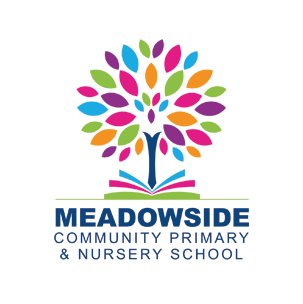Language Development
Intent
Our curriculum aims to be talk and vocabulary rich to help counter inequality, widen access to learning and improve life opportunities [1]. Therefore, Language Development is key to the curriculum at Meadowside. Research has shown a language and communication deficit for some pupils, particularly pupils from low-income households. Our school has a higher level of deprivation among our pupils (see IDACI rating) and therefore language development is key to the educational success of our pupils. If we are to achieve our mission statement, ensuring that they fully access their next steps in education and go on to engage in the wider world work and to build a better future individually, locally and for the wider world, then language development must be central. Our curriculum aims to be talk and vocabulary rich to help counter inequality, widen access to learning and improve life opportunities. Talk can also foster empathy and understanding contributing to the development of our attitudes and values shown below.
- Teaching of Oracy is key to this language development. ‘Great speakers are made, not born’ (Gaunt and Stott) [2]. We aim to employ strategies throughout the curriculum to develop the physical, linguistic, cognitive and social and emotional aspects of learning.
- ‘Dialogic teaching harnesses the power of talk to engage interest, stimulate thinking, advance understanding, expand ideas, and build and evaluate arguments, empowering students for lifelong learning and democratic engagement.’ (Alexander) [3]
- Vocabulary Development “By closing the vocabulary gap for children within our classroom with their peers, we can offer them the vital academic tools for school success, alongside the capability to communicate with confidence in the world beyond the school gates” (Quigley) [1]. Vocabulary development is pivotal to our curriculum and it is planned, sequenced and explicitly taught.
- Reading Dickenson et al [4] suggests that “reading offers our children the opportunity to hear new vocabulary items embedded in varied grammatical sentences. Books written for children use well-formed, relatively short sentences that are rich in varied vocabulary. Furthermore, books often use the same words in diverse grammatical constructions, offering implicit lessons in how words are used. The texts of books tend to have more low-frequency words than does spoken language [5] and books encourage use of a wider range of words than would occur in everyday conversations. Senechal and her colleagues [6], consistently finds that “parent reports of shared reading were a robust predictor of children’s receptive and expressive vocabulary” (page 179). “
Implementation
Language development is central to everything that we do at Meadowside. Within our school, we use Oracy as a way of enabling all pupils to develop confidence in expressing their own opinions, giving them a voice in the world. As Gaunt and Scott have stated, ‘Great speakers are made, not born’ [1]. We aim to employ strategies throughout the curriculum to develop the physical, linguistic, cognitive and social and emotional aspects of learning. We are also aware that Oracy is vitally important to enable the children to make progress in their writing. In the words of James Britton [2], ‘Writing floats on a sea of talk’. We promote quality talk using Voice 21 strategies, encouraging our pupils to reflect upon and evaluate their views and those of others concerning themselves, their community and the world. We have the expectation that this will also improve wider academic outcomes.
Reading is at the heart of our curriculum and plays a significant part in the language development of our pupils. As Mary Myatt states, [3] ‘Reading a story or high-quality non-fiction text is the most efficient way to build vocabulary’. Therefore, a range of quality texts and sources help to enrich the pupil’s learning experience. Pupils regularly visit our school library, both to read for pleasure and to gain access to reading material based around curriculum areas. Each class also has a reading area of both fiction and non-fiction texts and class teachers promote texts relating to current areas of learning. Subject leads are involved in the monitoring, evaluating and improving the content of our non-fiction library as relates to our curriculum. Our reading lead ensures that there is a breadth, quality and diversity to the books that are chosen. (See Reading Curriculum Policy)
Vocabulary development is integral to all of our teaching. It is progressively built up across lesson sequences, with each curriculum area having a vocabulary progression map of non-negotiable technical language to be taught and built upon. It is evident in displays within classroom, with key knowledge displayed upon road maps outside each classroom. Vocabulary is explicitly taught in all subject areas and assessed to ensure that children are retaining key vocabulary. Opportunities are taken within all curriculum areas to use oracy skills to develop understanding and use of vocabulary, and these are mapped into individual subject’s medium-term planning. Word Warriors (a bespoke approach based on Word Aware) is used to develop specific vocabulary that can be applied across the school. Where appropriate, vocabulary is pre-taught, to raise the standard of classroom talk when texts containing new vocabulary are introduced.
Philosophy for Children is used at the end of each History and PSHE topic to enrich talk and how lifes great issues effect us every day.
[1]Transforming Teaching and Learning Through Talk, Amy Gaunt and Alice Stott
[2] Language and Learning, J Britton (1970
[3] Back on Track, M Myatt
Voice21 Video

